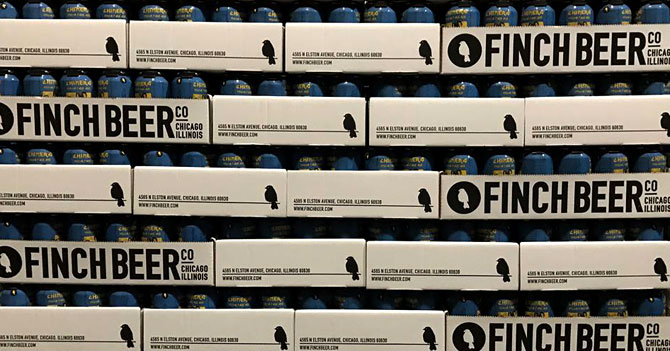
Four months after suspending its brewing operations, Chicago’s Finch Beer Co. plans to begin producing and delivering product once again this month.
“We never went away,” Finch managing partner Jamie Lisac told Brewbound, “but we’re back.”
It’s the latest move toward stability in the tumultuous 6-year life of Finch Beer, which was launched in 2011 by Ben Finch. The company struggled early on with beer-quality issues as well as a distribution strategy that favored broader market expansions over deeper local penetration. Finch, the founder, had also failed to make good on promises to build a brewery on the Chicago River — and later in Long Grove.
Midway through 2016, Mr. Finch was forced out of the company by investors who cited production inconsistencies, declining sales and a failure to achieve local market success as reasons for the takeover.
“I do believe we have some work to do to overcome those past failings,” Lisac said. “I feel like we’re in a position — between the brew team that we have and the facility — after a year of a lot of hard work to fix the sins of the past.”
The process of repairing those sins began in January, when Lisac struck a deal with Like Minds Brewing, a Wisconsin-headquartered craft brewery that had operated a secondary brewing facility in Chicago. As part of the deal, Finch took over Like Minds’ building lease and purchased its brewing equipment.
That move was necessary after the lease to Finch’s original Elston Avenue brewery expired last December. At the time, the owners had decided to halt production and auction off the company’s brewing equipment.

The newly acquired facility required extensive cleaning due to Like Minds’ focus on sour beer production, Lisac said, leaving Finch in limbo until equipment was disinfected. At the same time, Finch’s owners applied for and received a new federal brewing permit from the Alcohol and Tobacco Tax and Trade Bureau.
“We did that all in 90 days,” Lisac said. “It was hard. Extremely painful.”
The company is still waiting to receive its Illinois brewing permit, however.
“Fortunately, pint glass half full, we have the capacity to get caught up relatively quickly,” he continued, “which I know we will.”
Last year, Finch produced 8,000 barrels of beer; it peaked in 2015 at 10,200 barrels.
The move into Like Minds’ old space, coupled with the acquisition of 30-barrel automated brewing system capable of producing about 18,000 barrels of beer annually, has nearly doubled Finch’s brewing capacity, Lisac said. But potential 2017 output is still unknown, he added.
Finch will reenter the Chicagoland market via OneIllinois, a group of nine MillerCoors distributors also known as the “Chicago Cluster.” Out-of-state distribution will follow, Lisac said, and sales in the Chicagoland area will be the brewery’s primary focus moving forward.
“Chicago is our home,” he said. “It’s our backyard.”
Finch’s chief marketing and sales officer Ken Limas told Brewbound that wholesalers and retailers have remained patient throughout the company’s transition.
“They understand that the step that we’re taking is a necessary one,” Lisac added. “We’re getting into a more reliable, more technologically advanced, better operating space in a better location. This is just a short-term blip for longer-term stability.”
Limas said he expects Finch’s beer to once again be sold at accounts such as Whole Foods, Mariano’s and Binny’s, but he admitted that returning to on-premise draft lists won’t be easy due to the competitive market for constantly rotating taphandles.
“Getting that real estate back is a little more time consuming,” Limas said.
The first round of beers to hit the market will be 12 oz. cans and draft of Sungasm Belgian pale ale as well as 16 oz. cans of Skull Hammer IPA, Fascist Pig amber ale and Hardcore Chimera imperial IPA.
Lisac said the Finch brand itself would also undergo a facelift.
“We are refreshing some of our labels for the beers that have been out for a while,” he said.
With the new location, Finch now finds itself in the same area as Goose Island Beer Co., Great Central Brewing Company and the United Center.
“This can be a destination neighborhood,” Lisac said.
Unlike Goose Island and Great Central, however, Finch won’t initially open a taproom.
“We’ll do it as soon as we can,” Lisac said. “Our focus has been on getting back up and running and getting caught up.”
